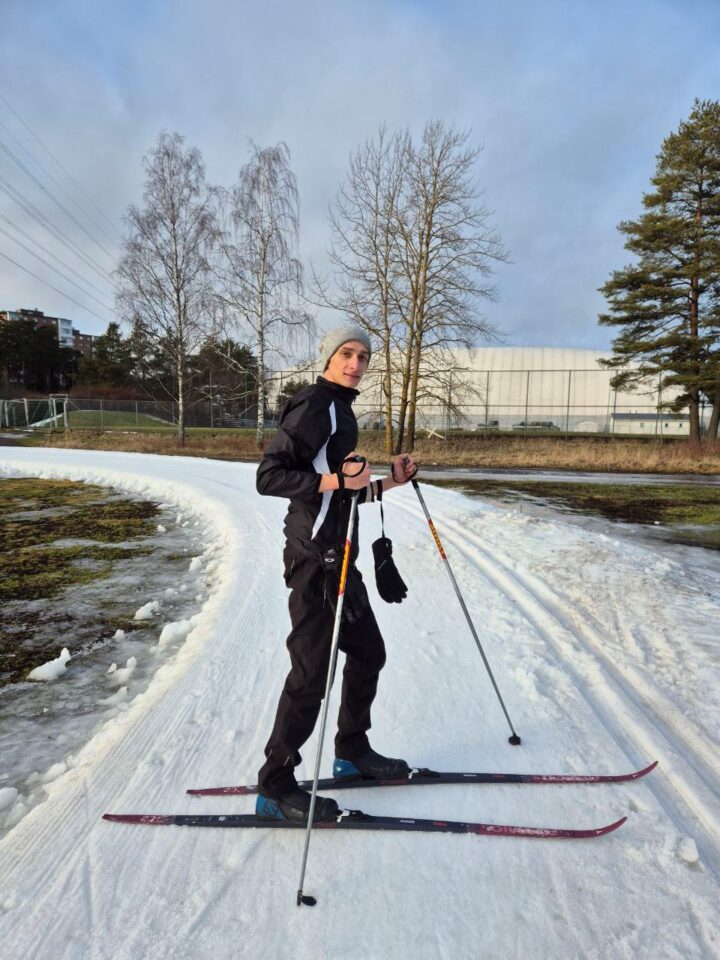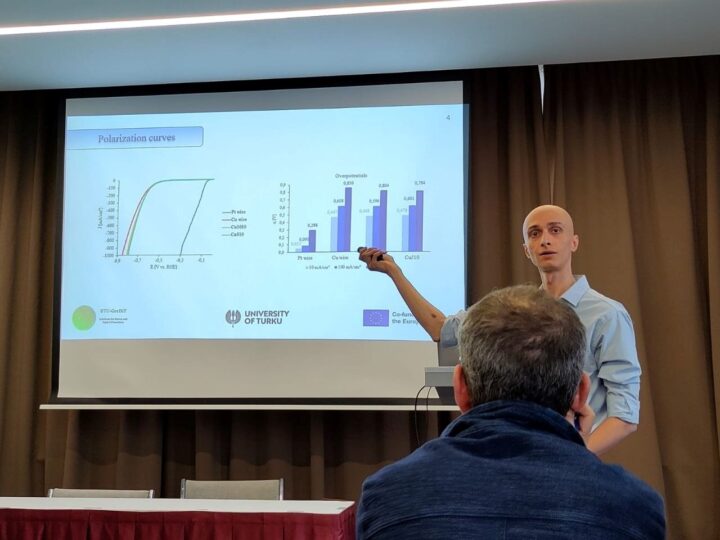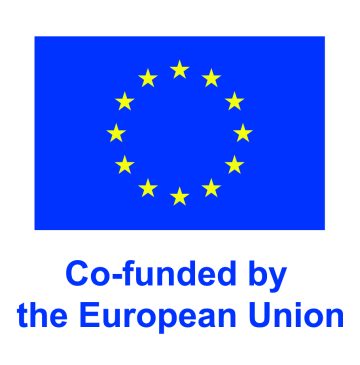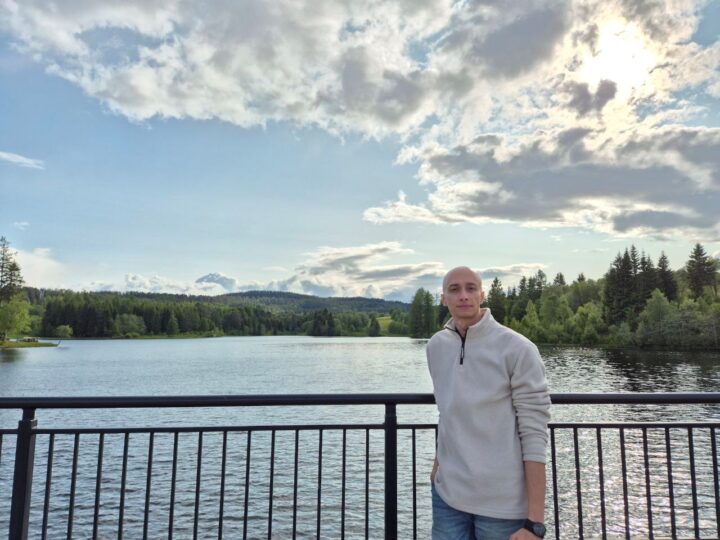Splitting Water, Building Dreams: Reflections on My PhD Journey
A year ago, I moved to Turku to begin my PhD in the UTU-GreDiT doctoral program. Since then, I’ve faced challenges, breakthroughs, and personal growth—both in the lab and in life. In this blog, I share what this first year has taught me: from adapting to Finnish culture and navigating research setbacks to finding balance and preparing for the future.
The Leap: From Dream to Departure
Every big journey starts with a dream, but reality hits when you’re standing at the airport with a one-way ticket. For me, that dream was a PhD in electrochemistry—combining my passion for science with the hope of contributing to green energy. The acceptance letter from UTU-GreDiT felt unreal. But excitement quickly mixed with anxiety: Would I fit in? Could I handle the research? What would life in Finland really be like?
But dreams don’t unfold automatically. In water electrolysis, water molecules won’t split unless you apply a certain push—at least 1.23 volts. This is how the change that seems impossible under normal conditions takes place spontaneously. That principle became a metaphor for my PhD journey. Change doesn’t happen on its own. You need to know where to put your energy, how to build the right conditions, and when to push forward. Whether it’s developing your research, adapting to a new culture, or preparing for your future career, progress comes when effort meets direction.
Arrival and Adaptation
I grew up in a big, densely populated city, so moving to Turku was a big change. I’d always wanted to live in a smaller, quieter place—somewhere close to nature, where you can actually see the sky and breathe clean air. Turku turned out to be exactly what I was hoping for.
Landing in Turku, I was genuinely excited. Everything was new: the language, the city, even the air felt different. I left home during a heatwave and arrived in Finland’s cool autumn, which was a shock to my system. I started my new life with a suitcase, a lot of hope, and, almost immediately, a cold. It felt like my body needed to adjust to everything at once.
The first days were full of new experiences. Grocery shopping was interesting—so many unfamiliar brands and foods. I quickly learned that “kahvi” means coffee, which is essential for the chilly mornings. Furnishing my apartment was a project in itself, with trips to various shops and malls. Each new piece of furniture made the place feel a bit more like home. Turku itself made a great impression on me. It’s green, peaceful, and close to nature. The roads are clean, the sky is clear, and there’s a lovely river running through the middle of the city. I love the old wooden buildings and the relaxed pace of life. Exploring the city was fun—walking along the riverside, checking out cozy cafés, and visiting Turku Castle. I tried out the university’s sports facilities and the city’s swimming pools. Even small things, like figuring out the bus system or finding my favorite bread, felt like achievements. I must say that I couldn’t have managed those first weeks without my friends, especially Vahid. He helped me with everything: finding an apartment, opening a bank account, and even showing me where to buy groceries. Having someone to guide me through all the practical stuff made a huge difference.
I was also excited to learn Finnish. I started right away, practicing phrases and trying to read signs. But my excitement quickly turned into frustration—Finnish is a tough language. The grammar and super-long words are challenging, and there are so many cases to remember. Still, I haven’t given up. I’m continuing to learn, just with more realistic expectations.
Speaking of the weather, gorgeous autumn passed quickly, and then winter arrived with the long darkness. Some days it felt like the sun barely rose, and walking on frozen, sand-scattered sidewalks became a daily test of balance. At the same time, I learned that winter is not only about endurance — it can also be enjoyable. Sports facilities and outdoor activities make the season easier to handle. I found out quickly that I am terrible at ice skating. Cross-country skiing, on the other hand, became something I enjoyed more than I expected. And although I never thought I would say this, I hoped the temperature would stay below zero and that the snow would remain during the whole winter. If you live here, you already know what I am talking about.

Research and Reality
Research is at the heart of the PhD. My studies focus on flexible water electrolysis for hydrogen production using earth-abundant or cost-effective materials. In simpler terms, I’m working on making hydrogen—a clean fuel for the future—cheaper and more sustainable to produce. The process simply involves splitting water into hydrogen and oxygen using electricity. It is an exciting, but also intimidating job. Platinum and iridium are standard for this reaction, and they are so good at their job that finding a substitute that beats them in performance seems impossible. On the other hand, I am the only one in our research group working on electrocatalysts, which meant starting from scratch—designing experiments, troubleshooting equipment, and sometimes feeling lost.
Over the past year, I’ve tested copper- and nickel-based materials, trying to see if they can stand up to the harsh conditions inside an electrolyzer. In this sense, competing with platinum, when your main tool is copper, feels like showing up to a sword fight with a wooden stick, and this is where I faced the practical challenges of replacing noble metals. You read about promising results in scientific papers, but when you try to reproduce them, reality often hits hard. Equipment breaks down, samples behave unpredictably, and sometimes weeks of work lead to disappointing results. I’ve spent a lot of time studying the surface of my electrodes, trying to understand how they look and behave at the micro and nanoscale, and searching for ways to tune their properties for better activity and durability.
Research can be tough, but now and then it reveals its sweet side. One of the most rewarding moments came when I finally captured microscopic images of the fractal structures I had been trying to grow on the electrode surface. They looked just as I had imagined — intricate, branching patterns that proved my approach was working. Observing those shapes for the first time felt like a breakthrough. After so many setbacks, it was deeply satisfying to witness something unfold exactly as I had envisioned.
As a conclusion, the road to a PhD is not straightforward; you have to keep yourself motivated, learning, and trying different ways. There have been setbacks—poor performance, lack of long-term stability, and the frustration of experiments that don’t go as planned. But there are still many materials and strategies I haven’t tried yet. I’ve learned that research isn’t about instant success; it’s about being curious, methodical, and willing to keep going even when things don’t work out. What keeps me motivated is the bigger picture. The knowledge, skills, and connections I am developing during my studies here will prepare me for a future career in the growing field of green hydrogen, which I have always been striving toward.
Beyond the Lab
One of the most rewarding aspects of the UTU-GreDiT program is providing the opportunity to connect with the wider research community. During the first year of my studies, I participated in a conference, a workshop, and a summer school, and I had the chance to present my work, exchange ideas, and learn from researchers across disciplines and countries. These experiences have helped me to develop my presentation and communication skills, and also provided me with collaboration opportunities.
I attended Nordic Hydrogen Week in Oulu. It was fascinating to see how industry and academia interact in shaping the future of hydrogen technologies. The event highlighted the importance of collaboration—not just between researchers, but also with companies, policymakers, and engineers working on real-world applications. It reminded me that research doesn’t happen in isolation. It grows stronger through dialogue, feedback, and shared goals.
The main event was the HERMES workshop in Brno, Czech Republic, where I delivered an oral presentation of my early results. Standing in front of experts in my field and sharing findings that were still quite preliminary was stressful. I remember feeling nervous about how my work would be received, especially since I was still in the early stages of testing materials. However, the experience pushed me to sharpen my thinking and present my ideas more clearly. It was a turning point in building confidence and learning how to handle constructive criticism.
Another memorable experience was the summer school at NTNU in Trondheim, Norway. The program was packed with talks on energy storage systems and green hydrogen production, which gave me a broader perspective on how my research fits into the bigger picture of sustainable energy. We also visited SINTEF, a leading research institute active in energy storage technologies. I had the chance to present both a poster and an oral presentation, which led to valuable discussions and feedback on my work.
Throughout these experiences, I’ve been fortunate to have supportive supervisors who encouraged me to take part in these events. Their guidance has been crucial in helping me navigate the academic world and seize opportunities that have enriched my PhD journey.
The most exciting feature of the UTU-GreDiT program for me is the opportunity to undertake secondments—temporary research stays at partner institutions. For me, this means an upcoming stay at the Technical University of Munich. I first connected with the group there during the HERMES meeting, and since then, my enthusiasm has only grown. The team’s expertise and research focus align closely with mine, and I see this secondment as a unique opportunity to contribute to their work while learning from their approach. Exposure to various labs and work environments is invaluable for any young researcher. It helps you see your own project from new angles, adapt to different research cultures, and build lasting professional relationships. I consider this secondment a cornerstone of my PhD journey—one that will not only deepen my scientific understanding but also broaden my perspective on collaboration and innovation.
And here I think I must thank my supportive supervisors who encouraged me to take part in these events even when I doubted whether I was ready to present my work.

Finding Balance
PhD life isn’t just lab work. In fact, it can’t be. Research is demanding, and without something to balance it out, it’s easy to burn out. I’ve learned that having hobbies and interests outside of science isn’t just a luxury—it’s a necessity.
For me, sports play that role, especially cycling. It’s more than just exercise; it’s a way to clear my head, reset my focus, and reconnect with the world outside the lab. Whether I’m riding through the forests around Turku or just taking a short trip along the river, cycling helps me stay grounded. It’s a rhythm that contrasts with the often unpredictable pace of research. Others find their balance in music, gardening, or social activities. I’ve met fellow PhD students who play instruments, join local clubs, or volunteer. These activities create space to breathe, reflect, and recharge. They also help build community—something that’s especially important when you’re living far from home.
Finding balance doesn’t mean stepping away from research—it means creating space where ideas can breathe and where you can return to your work with fresh energy. It’s one of the most important lessons I’ve learned this year, and one I’ll carry with me throughout my PhD journey.
Closing Thoughts: Building the Grounds for What Comes Next
Looking back on my first year, I see more than just experiments and data. I see a journey of adaptation, learning, and quiet transformation. From navigating Finnish winters to presenting my research abroad, each experience has shaped me in ways I didn’t expect.
The metaphor of water splitting still resonates. Just like in electrolysis, where the right voltage unlocks a powerful reaction, I’ve learned that getting a PhD or preparing for your desired career can happen more smoothly than expected—if you know where to put your effort. It’s not about pushing harder all the time, but about building the right conditions: supportive mentors, meaningful connections, and a balance between work and life.
I’m excited about what comes next—especially my upcoming secondment in Munich. But I also know that the foundation I’ve built this year will carry me forward. The setbacks, the small victories, they’ve all been part of something bigger. And if there’s one thing I’ve learned, it’s this: the impossible starts to look possible when you understand the system, trust the process, and keep showing up.
Follow Mahdi on LinkedIn!
 Co-funded by the European Union. Views and opinions expressed are however those of the author(s) only and do not necessarily reflect those of the European Union or European Research Executive Agency (REA). Neither the European Union nor REA can be held responsible for them.
Co-funded by the European Union. Views and opinions expressed are however those of the author(s) only and do not necessarily reflect those of the European Union or European Research Executive Agency (REA). Neither the European Union nor REA can be held responsible for them.
